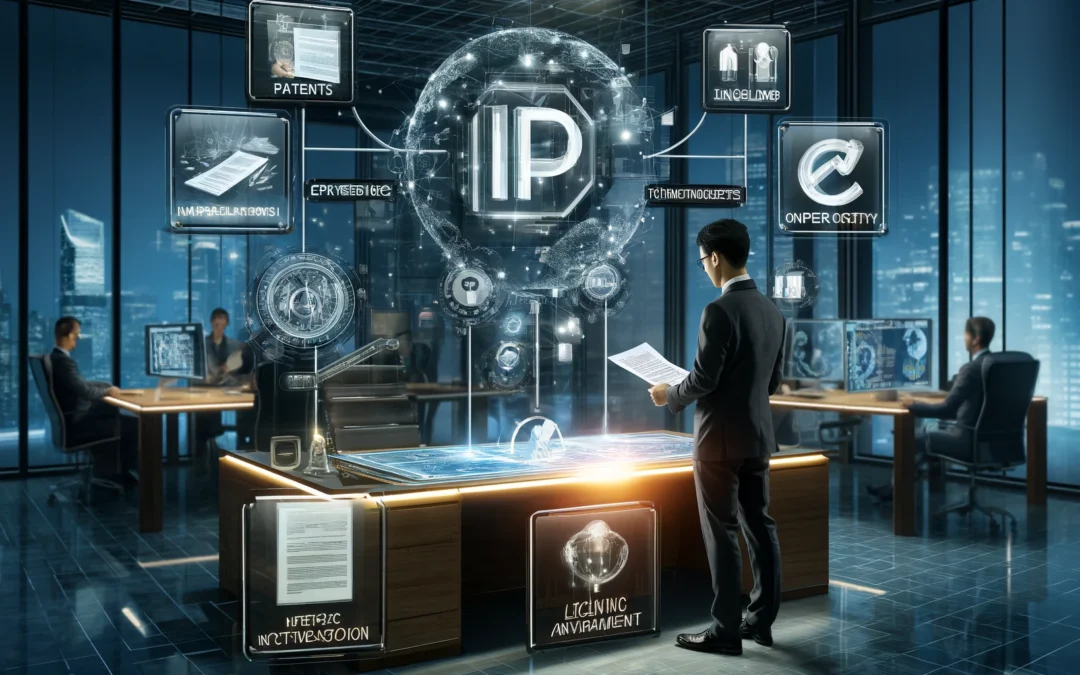As technology lawyers working in emerging technology, our biggest value is protecting and commercialising the founders IP
The why ?
In the fast-paced world of intellectual property (IP), safeguarding your creations is paramount. Whether you’re an inventor, artist, or entrepreneur, understanding when you need an IP license and then ensuring you include the essential terms protecting your rights and assets is vital and this is how
What Triggers the Need for an IP License?
1. Use of Protected Intellectual Property:
If you intend to use someone else’s intellectual property, such as trademarks, patents, copyrights, or trade secrets, for commercial purposes, you typically need a license. This applies whether you’re using it in a product, service, or any other form of business activity. This is essential if you wish to avoid legal action being taken against you for infringing another companies intellectual property or passing off which is basically confusing clients that you’re working with them, when you might not be, or utilising their IP for profit without consent.
2. Collaborative Ventures:
When collaborating with others, especially in joint ventures or partnerships, clarifying ownership and usage rights through an IP license ensures a clear understanding of each party’s rights and responsibilities. This is also very important if you have an outsourced company or self-employed contractor developing your IP or utilising your IP.
3. Franchising:
Franchising involves granting the right to use your IP, like trademarks and business processes, in exchange for fees or royalties. An IP license is crucial in such arrangements to outline the terms of usage and payment. This protects your brands so that it’s only use for the purpose and had the jurisdiction permitted. You can set terms and conditions as to how this can be utilised and not modified.
4. Licensing Out:
If you’re the owner of intellectual property and wish to allow others to use it, licensing out your IP can be a lucrative business strategy. In this case, drafting a comprehensive license agreement is essential to protect your interests. This make sure that you limit its use, they can’t assign this to other third parties, make sure you get a share of the profits it’s generating and you have complete control in the way that this is used and restricted from modification.
Essential Terms in an IP License Agreement
1. Scope of License:
Clearly define what rights the licensee (the party receiving the license) has, including the territory, duration, and purpose for which the IP can be used. This ensures both parties understand the extent of the agreement.
2. Ownership and Use Restrictions:
Specify that the licensee does not acquire any ownership rights to the IP and outline any restrictions on its use, such as prohibiting modification or sublicensing without prior consent.
3. Royalties and Payment Terms:
Detail the financial aspects of the agreement, including the amount and frequency of royalty payments, payment methods, and consequences for late payments or breaches of payment obligations.
4. Quality Control and Maintenance:
Maintain the quality and reputation associated with the IP by including provisions for quality control standards that the licensee must adhere to, as well as responsibilities for maintenance and updates.
5. Indemnification and Liability:
Clarify each party’s liability in case of infringement claims or other legal disputes related to the use of the IP, and establish procedures for handling such situations, including indemnification clauses. It’s also good to put a clause in there to cover you for any legal costs or damages claimed which is outside of your control.
6. Termination and Renewal:
Outline the circumstances under which the agreement can be terminated, such as breaches of contract or insolvency, and include provisions for renewal or extension if desired.they should also have a fixed period or cancellation and notice clauses for clarity.
7. Governing Law and Dispute Resolution:
Ideally, if you are based in the UK or your intellectual properties is registered in the UK then you should subject all terms and conditions to England and Wales. This has a robust legal system that can easily be followed and of protection.
By drafting a comprehensive license agreement that addresses these key components, you can
1. mitigate risks
2. ensure a mutually beneficial arrangement for all parties involved.
3. The main principle, however, is you maintain ownership and control of your intellectual property ;
4. or when utilising another’s intellectual property it assures you have consent & and potentially avoids disputes
Law does not have to be complicated. Emerging law from emerging technology lawyers means bespoke crafted documents to protect you and your business.

